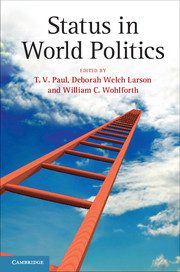Book contents
- Frontmatter
- Contents
- Figures
- Tables
- Contributors
- Acknowledgments
- Part I Introduction
- Part II Admission into the Great-Power Club
- Part III Status Signaling
- Part IV International Institutions and Status
- Part V Status, Authority, and Structure
- 9 Status Conflict, Hierarchies, and Interpretation Dilemmas
- 10 Status, Authority, and the End of the American Century
- Part VI Conclusions
- Index
- References
9 - Status Conflict, Hierarchies, and Interpretation Dilemmas
Published online by Cambridge University Press: 05 June 2014
- Frontmatter
- Contents
- Figures
- Tables
- Contributors
- Acknowledgments
- Part I Introduction
- Part II Admission into the Great-Power Club
- Part III Status Signaling
- Part IV International Institutions and Status
- Part V Status, Authority, and Structure
- 9 Status Conflict, Hierarchies, and Interpretation Dilemmas
- 10 Status, Authority, and the End of the American Century
- Part VI Conclusions
- Index
- References
Summary
Without question state decision makers seek and have sought status. It is certainly not the only goal that they pursue. But then, we have not had much luck theoretically restricting state goals solely to maximizing power or security. We should be open to alternative motivations. Improved status aspirations for rising powers, in particular, are quite prominent in world history. Whether the aspirations are accommodated or not (and not is more common), rising powers historically have been expected to “make their bones” by demonstrating their worthiness for promotion into a system’s elite through displaying some degree of martial prowess on the battlefield. Examining Jack Levy’s great-power schedule, seven of eight new states rising into great-power status are associated with violence. The Netherlands (1609) had to fight Spain to a temporary truce, Sweden (1617) had to defeat Poland and Russia, Russia (1721) had to win the Great Northern War, Prussia (1740) had to seize Silesia from Austria and hang onto it, Italy (1861) fought Austria in 1859 (albeit with French help) and two wars in 1860 over the control of Rome and Sicily, the United States (1898) acquired Spanish colonies coercively, and Japan (1905) defeated both China and Russia prior to its ascension. Only China (1949) did not have to beat any foreign foe, but one side had to win a long-running civil war and, within a year, take on the international system’s strongest power in Korea. It is not surprising, then, that rising powers and their enhanced status concerns are worrisome. The history of great-power ascensions has been less than pacific. It may well be that we have moved beyond older, more primitive rites of passage for entry into elite circles, but that remains to be seen. Other than the partial Chinese exception, no state has been accorded great-power status without a fight of some sort.
- Type
- Chapter
- Information
- Status in World Politics , pp. 219 - 245Publisher: Cambridge University PressPrint publication year: 2014
References
- 5
- Cited by

